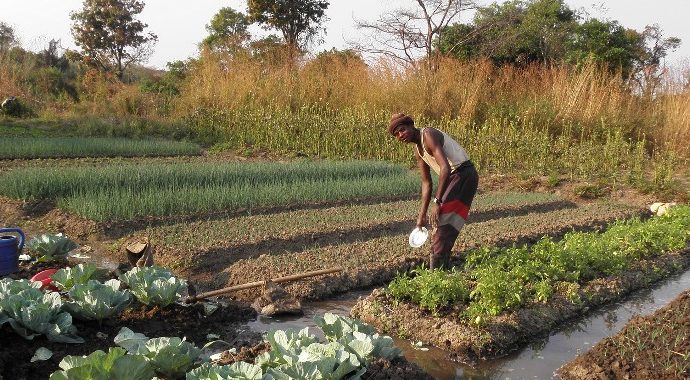- No Scope for Organic Farming in Pakistan
As defined by FAO (1999)
“Organic farming is an environmental friendly ecosystem management in which, use of all kinds of synthetic inputs is eliminated”.
Common Misconceptions about the Agriculture Industry in Pakistan Part-2
In the area demarcated for “organic farming” crops are cultivated without the use of synthetic fertilizers, pesticides, veterinary drugs, hormones, Genetically Modified Seeds (GM seeds) and breeds, additives, preservatives etc. The demand for organically grown food crops has risen to a great extent in the recent years due to the harmful effects of the food grown with the use of pesticides and chemical fertilizers.
The use of chemicals to increase the crop output has unanticipated damaging effects on our body. The food we eat these days is full of harmful elements because of the use of synthetic fertilizers and pesticides. Some people argue that rinsing the vegetables and fruits thoroughly with water will completely eliminate harmful elements but in reality, although this process may wash away the pesticides from the outer surface, it will not make food fully pure as it is contaminated from inside as well.
Pakistan is facing a potential threat of losing many international markets after the introduction of World Trade Organization (WTO). Recent export trends indicate that Pakistan is exporting fruit largely to the Middle East, Sri Lanka and the Central Russian States, because in those countries quality standards are not as strict as compared to the developed countries. The current exports of Kinnow to European countries is almost nil. Pakistan has, therefore, in the process of introducing Euro Good Agricultural Practice (Euro GAP) to upgrade its farming standards in line with International standards.
Pakistan possesses one of the greatest potentials among the developing countries in organic farming if proper planning and foresighted measures are taken. Millions of acres of highly fertile and productive-virgin lands can be the potential areas for delineation as organic farming areas. The organic farming may have a nonstop-able impact to alleviate poverty by providing large-scale employment to unskilled or semi-skilled labor in cultivating the productive-virgin lands.
Pakistan is bestowed with exceptional and diverse crop/animal husbandry growing conditions which make it the best place to pursue organic farming. The organic produce can increase the farm income manifold depending on quality and adoption of strict discipline for quality.
Agriculture is not Backed by Pakistani Government
Anyone in the agriculture business knows that farming is very expensive. The expenses of starting up and running a farm can be overwhelming, and it’s possible you may be in need of financing especially if you had a flooded farm in recent past and need to cultivate a new crop. That’s where an agriculture loan is required most.
There is a general misconception about Pakistan government that it doesn’t help farmers especially financially. However, many financing/loaning schemes have been launched by federal and provincial governments on concessional rate of markup for financing crop production loans (seed, fertilizer, pesticides & other etc). Almost every bank in Pakistan has different agricultural loaning products on the instructions of State Bank of Pakistan to facilitate the farmers.
These agricultural loans are precisely designed for use in the agricultural industry and there are many ways farmers can use these loans to get their farms running or expanding their operations. However, careful use of that loan is warranted for success.
Before you make up your mind for an agriculture loan, you need to plan how to spend the money. You should ascertain, what resources will most benefit you and keep your operations running? How much and how long do you need to borrow? You’ll need to have these plans in place before you get the loan because the bank will ensure that you use the loan in the right way.
- Small Farms are Unimportant
In Pakistan due to inheritance system large cultivable lands are being divided into small farms and economist have confidently forecasted that these small farms are reducing the per hectare production. They have declared small farms as backward, fruitless, and inefficient and above all an obstacle to economic development. But this theory seems to be wrong if we can see the agriculture in the large picture.
Small farms perform several functions to benefit both society and the environment, and which contribute far more than just one commodity but there is enough evidence that a small farm model for agricultural growth could produce far more food as compared to a large farm. As per World Bank studies, in Pakistan, there is ample evidence in favor of small forms in terms of productivity as compared to large forms productivity.
Small farms represent great diversity in ownership, in cropping systems, in landscapes, in the biological organization, culture, and traditions. A diverse farm structure backs biodiversity, a diverse and aesthetically pleasing rural landscape, and open space.
Large farmers often plant specific crops as they are the easiest to manage with heavy machinery with short time and effort. Small farmers, in Pakistan, plant crop mixtures even engage the technique of intercropping where the empty space between the rows is occupied by other crops. They also combine or rotate crops and livestock, in order to replenish soil fertility. This type of farming system produces far more per hectare than do some specific crops.
From the economist’s point of view large farm is more productive because these farms produce more, we can say, wheat per acre. But these large farms not producing the other six, eight, ten or twelve products that the smaller farm is producing. In addition, all our vegetables and daily use herbs are also the products of small farms. When we add all of these together, they result in a much greater total agricultural output per acre than the larger farms are producing.
Small farms ownership helps not only more equitable economic opportunity for people in rural areas but also greater social capital. This type of ownership induces a greater sense of personal responsibility and feeling of control over farmers’ life. Moreover, landowners are more likely to be held accountable for any negative actions that harm the community.
Small family farms are taken as nurturing places for next generation to grow up and acquire values. The skills of farming are passed from one generation to another under family ownership system.
In small farms, productive activities, consumption patterns, labor mobilization, ecological knowledge and shared interests in the long-term maintenance of the farm as a resource, contribute to a stable and lasting economic and family-based enterprise as future of the family is based on this farm. Work quality, management, knowledge, and relationships are intertwined and mutually reinforcing. Family farmers regularly achieve higher and more dependable production from their land than do larger farms operating in similar environments.
Concluding the above-stated facts, we can say that a total or prolonged disconnection from agriculture leads us to believe that we understand the facts more than we do but the case is otherwise. Ground realities are far different from what we perceive after studying in classrooms or what is being fed to investors by dealers. We make unwise assumptions about the agricultural ability of Pakistan due to lack of both knowledge and interest. In short, we have many misconceptions about the promising and never betraying agriculture industry of Pakistan.
Common Misconceptions about the Agriculture Industry in Pakistan



